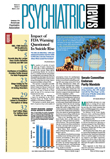Second-generation antidepressants produce roughly equal results, but evidence is still lacking to predict how most adult patients will respond to specific drugs, according to a new systematic review of research by the federal Agency for Healthcare Research and Quality (AHRQ).
In general, these drugs have similar rates of adverse events, but the study found evidence for specific side-effect patterns for certain drugs.
Collectively, 62 percent of the patients responded to treatment with selective serotonin reuptake inhibitors (SSRIs) or selective norepinephrine reuptake inhibitors (SNRIs) after six to 12 weeks, although 54 percent failed to achieve remission.
“Differences in efficacy reflected in some of these meta-analyses are of modest magnitude, and clinical implications remain to be determined,” wrote the researchers, headed by Gerald Gartlehner, M.D., M.P.H., of the Cecil G. Sheps Center for Health Services Research at the University of North Carolina.
The reviewers combed through 2,099 citations to find 293 published articles that met inclusion criteria. Of the 293, 187 were considered of good or fair quality. Of those 187 trials, 89 were head-to-head randomized controlled trials, and 57 were placebo-controlled, randomized trials. Most (126 trials) were funded by pharmaceutical companies, and 17 by government agencies; the funding source could not be determined for 44 studies.
Data from head-to-head trials were sufficient to conduct meta-analyses for only four drug-drug comparisons: citalopram/escitalopram, fluoxetine/paroxetine, fluoxetine/sertraline, and fluoxetine/venlaflaxine.
Data on adverse events were either unavailable or hard to evaluate, wrote the researchers. They analyzed 72 head-to-head trials (with 16,780 patients) and 39 experimental or observational studies. Only five randomized, controlled trials were intended to detect differences in side effects, and few studies used objective criteria to measure them. About 61 percent of trial participants reported at least one adverse event.
Some specific adverse-event patterns emerged from the meta-analysis. There was strong evidence for higher incidence of nausea and vomiting among users of venlafaxine than other SSRIs, for instance, while sertraline produced higher rates of diarrhea, mirtazapine users gained more weight, trazodone caused more sleepiness, and bupropion was associated with less sexual dysfunction. There was little difference in how well patients adhered to taking their antidepressants.
The AHRQ study found little evidence to suggest significant differences among these drugs on the basis of patient age, sex, race or ethnicity, or comorbidities.
Many physicians have prescribed antidepressants with adverse effects in mind, Daniel Safer, M.D., an associate professor of psychiatry and behavioral sciences at Johns Hopkins University, told Psychiatric News. For example, they might avoid using a drug with a short half-life if withdrawal symptoms might be a concern or not use one that induces psychological activation for a suicidal patient.
Studies like the AHRQ report can help place antidepressant choices in perspective, he said.
“Individual doctors can't always tell how well a drug will work on a given patient because they see relatively small numbers compared to a clinical trial,” he said. “You have to look at the methods section [of studies] and the small print to see if the conclusions are biased.”
If efficacy is roughly similar across all these drugs, then the AHRQ study at least implies that antidepressant choices might be made on the basis of their side effects or cost. Prescribing patterns may not always result from a drug's efficacy or side effects, Safer pointed out. Heavy marketing of on-patent medications may affect doctor's choices.
(Safer said he has no financial relationship with any pharmaceutical company. His own research, often with cross-town colleague Julie Zito, Ph.D., of the University of Maryland looks for epidemiological patterns in Medicaid datasets.)
Better tracking of drugs after they are approved might also improve the quantity and quality of data on efficacy, efficiency, and side effects, said Safer.
“Other countries, like Great Britain, Denmark, or Canada, have good postmarket surveillance programs, but the U.S. is only just getting started,” he said.
Gartlehner and colleagues suggested that more generalizable research is needed to help physicians make decisions in their practices.
“Effectiveness trials with less-stringent eligibility criteria, patient-centered health outcomes, long study durations, and populations representative of patients encountered in primary care would be valuable to determine whether existing differences of second-generation antidepressants are clinically meaningful in 'real-world' settings,” they wrote.
Antidepressants Assessed
The report from the Agency for Healthcare Research and Quality, a division of the Department of Health and Human Services, summarizes the available evidence on the comparative efficacy, effectiveness, and harms of 12 second-generation antidepressants—bupropion, citalopram, duloxetine, escitalopram, fluoxetine, fluvoxamine, mirtazapine, nefazodone, paroxetine, sertraline, trazodone, and venlafaxine—in treating patients with MDD, dysthymia, and subsyndromal depression. It also evaluates the comparative efficacy and effectiveness for maintaining remission and for treating accompanying symptoms such as anxiety, insomnia, or neurovegetative symptoms.▪
